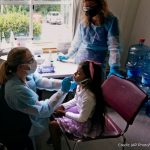Nurse Utilizes Innovation to Create a Health Equity Media Outlet
 As a Nurse Entrepreneur, creating and implementing new ideas in healthcare was something I’ve always done. In the roles of mentor, speaker, and author I’ve often been called upon to think outside the box. Once the pandemic hit, I was forced to do some “soul searching” when I saw the devastating effects of the pandemic, specifically towards Black Americans.
As a Nurse Entrepreneur, creating and implementing new ideas in healthcare was something I’ve always done. In the roles of mentor, speaker, and author I’ve often been called upon to think outside the box. Once the pandemic hit, I was forced to do some “soul searching” when I saw the devastating effects of the pandemic, specifically towards Black Americans.
Michelle Rhodes, MHS,RN, CMCN
As a Nurse Entrepreneur, creating and implementing new ideas in healthcare was something I’ve always done. In the roles of mentor, speaker, and author I’ve often been called upon to think outside the box. Once the pandemic hit, I was forced to do some “soul searching” when I saw the devastating effects of the pandemic, specifically towards Black Americans. Blacks have died at three times the rate of their white counterparts, and forced me to ask “why” and “what can I do to help?” By taking time to examine my strengths, I realized that I had an affinity towards writing (published author) that I could combine with my love for managed care (20+ years of examining zip code data, care coordination, and health program creation). Meshing both of my worlds together, I created The Color of Wellness Magazine.
I realized that I was able to see gaps in preventive education at an experienced level. By putting the pieces together, I recognized that the lack of wellness education was most often not in the equation within the lifestyles of communities of color. This critical thinking led to an idea of a magazine. Throughout my years of self-publishing, I had often considered a magazine, but left it on the back burner. As the pandemic began to wreak havoc among my community, I felt an “urgency” to bring education directly into the hands of those who needed it the most. I knew that I could not just sit at my computer and work my business daily, and not pitch in some sort of way. While I am no longer the bedside nurse, I am a nurse at heart.
Her Solution
I then reached out to a few of the best and brightest of my colleagues to help contribute to my “Color of Wellness” magazine. With over 16K followers across social media platforms, I hand selected 12 executive contributors of various nursing backgrounds. They are the core engine of this historical publication. It is because of them that we can now disseminate and discuss topics of wellness that concern people of color the most. This publication gives a voice to the Black Nurse, and celebrates the nurse as a person. We are more than the accolades, we are more than poster presentations, we are more than non-implemented research. We are MORE! When was the last time that you saw your neighborhood nurse on the cover of a magazine having a voice about their lifestyle and the things that they love? Now we are relatable. Now the community sees us as “one of them” and the dialogue can take place. Having celebrated our first year of success with this platform, we just brought on a new group of amazing nurses for year two. By tackling wellness concepts and by bringing well-being education into our own hands, we can hopefully save lives by establishing healthier habits within vulnerable communities. This is urgent; the time is now, chronic disease has plagued our communities for way too long, I felt. We work there. We live there. But look what the pandemic did to us. I felt in my heart that black nurses were the inevitable solution to these problems that plague us. For too long we have been silent, not given a platform, or just too tired to get out and serve like we should. My prayer is that “The Color of Wellness” media platform is the springboard to the greatness that lives inside of us. And now, it is personal. Covid took our mothers, fathers, family, friends, and coworkers. Why at such a higher rate than any other race? Prior to the vaccines, it was mainly due to the state of our health and wellbeing. I vowed to do my part in ensuring that it does not happen again. By utilizing our power of being relatable, hardworking, and passionate as nurses, we stand ready to serve as boots on the ground, and serve as the change agents that we often speak of, but rarely see.
Health Equity: Bridging the Gap
According to Americanactionforum.org, recent estimates attribute 10 to 20 percent of health outcomes to medical care, 30 percent to genetics, 40 to 50 percent to behavior and 20 percent to the social and physical environment. That means most of the work in terms of wellness happens outside of the hospital by social determinants (non-medical factors) that include factors such as where individuals live, learn, work, and age, in addition to socioeconomic status and race. These social determinants of health have gotten a lot of attention recently, as research continues to show a person’s health can depend heavily on their zip code and circumstances in life.
Although we do not have all the answers to this momentous and structural problem, concerns on health equity and health inequality must continue to be raised. It is good to see that the healthcare industry is attempting to address these issues. However, the trend of increased spending on chronic care yet decreased wellness across the entire population, especially members of vulnerable demographics, must be brought to the table. In many of our vulnerable communities, our health lacked wellness, which has been linked and influenced by multiple socioeconomic factors and caused many preventable deaths. Black nurses are the missing voice in this solution, as we can help bridge the gap to both worlds. We are excited to serve as the change that we wish to see.
And in 2022, please join us for our quarterly live virtual workshops, as we continue to address issues that plagues us. We kicked off our Quarter 1 series with our “Obesity Forum for Black Families”. For Quarter 2, we held a forum to address “Heart Health in Black America” attended by the American Heart Association. Stay tuned for our “Cancer in Black America: Our Stories” for Quarter 3.
(This story originally appeared on ANA’s Nursing World.)




